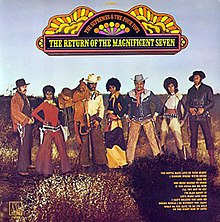The Return of the Magnificent 7
| The Return of the Magnificent Seven | ||||
|---|---|---|---|---|
 |
||||
| Studio album by The Supremes and The Four Tops | ||||
| Released | July 1971 | |||
| Recorded | 1970 | |||
| Genre | Soul | |||
| Label | Motown | |||
| Producer | Frank Wilson | |||
| The Supremes chronology | ||||
|
||||
| The Four Tops chronology | ||||
|
||||
| Professional ratings | |
|---|---|
| Review scores | |
| Source | Rating |
| Allmusic |
|
The Return of the Magnificent Seven is the second collaborative album between Motown label-mates The Supremes and Four Tops, released in 1971. The production only featured two covers compared to their first album together, The Magnificent 7, that included more than eight. Although the three albums the Supremes recorded with the Four Tops did not match the commercial success of the Supremes/Temptations duet albums (ironically loaded with covers), what they did have instead were original tunes, soulful lead vocals by Jean Terrell and Levi Stubbs and high production values in terms of arrangements and orchestration.
This second release is probably the best of the three Supremes/Four Tops albums. It includes two early songs by Dino Fekaris (who would go on to compose "I Will Survive") and Nick Zesses that were released as singles: "You Gotta Have Love in Your Heart" (in the United States, United Kingdom, West Germany, Italy and Netherlands) and "I'll Try Not to Cry" (in France and Netherlands). Both songs were produced by Clay McMurray and had on their flip sides tunes by Nick Ashford and Valerie Simpson: respectively, the romantic ballad "I'm Glad About It" and the up-tempo, Latin-flavored "One More Bridge to Cross", a typical Ashford & Simpson song with a social commentary. McMurray also produced Tom Baird's "I Wonder Where We're Going" (sung almost collectively by the seven singers) and his own composition, "Where Would I Be Without You Baby". Veteran producer Henry Cosby was in charge of a cover of Petula Clark's hit "Call Me" (written by Tony Hatch); a smooth love song of his own, "If You Could See Me Now", and a third contribution by Zesses and Fekaris, the ballad "Let's Make Love Now". Johnny Bristol produced a remake of Tammi Terrell's solo hit, "I Can't Believe You Love Me", and Bobby Taylor closed the album with a happy ballad about puzzling lovers, written by Pam Sawyer and Gloria Jones, "What Do You Have to Do (To Stay on the Right Side of Love)", also featuring solo vocals by Mary Wilson.
...
Wikipedia
